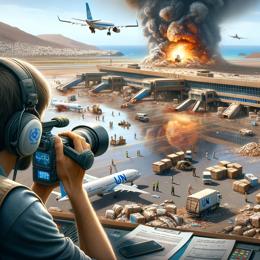Image created by AI
Sinking of Rubymar Intensifies Yemen Conflict and Environmental Concerns
The geopolitical tensions in the Red Sea have escalated following the sinking of the cargo ship Rubymar, presenting a dual crisis of maritime security and looming environmental disaster. Struck by missiles launched by the Yemeni Houthi rebels last month, the UK-owned, Belize-flagged vessel went down on Friday night amidst adverse weather conditions, the Yemeni government confirmed on Saturday.
The incident poses a significant threat to the region's maritime interests, marking the latest development in the ongoing warfare between the Houthi movement and the international coalition led by Saudi Arabia, which includes support from western nations such as the UK and the US. The Houthi rebel group has asserted their barrage on cargo ships connected to Israel, the US, and the UK, aiming at coercive leverage to halt Israel's offensive actions in Gaza.
The MV Rubymar's saga began on February 18 when it was targeted while navigating through the strategic Bab al-Mandeb Strait, promptly leading to the crew's evacuation. The ship, laden with over 41,000 tonnes of combustible fertilisers, suffered extensive damage that not only resulted in an expansive 18-mile oil slick but also significantly disrupted one of the world's busiest maritime routes.
While the crisis cell of Yemen's government addressed the ship's precarious condition and subsequent sinking, the ship's operator, Blue Fleet, represented by its chief executive Roy Khoury, has not confirmed the vessel's demise due to the absence of personnel on site.
The Rubymar is the first vessel reported to have been lost since the Iran-backed Houthi insurgents intensified their maritime assault campaign in November 2022. This loss comes at a pivotal moment, as the disrupted shipping poses a logistical challenge, with alternative routes such as the Cape of Good Hope significantly lengthening journey times and extending shipping routes by thousands of nautical miles.
The environmental implications are grave. Yemen's government has sounded the alarm over an impending environmental catastrophe, one that could impact marine ecosystems and local livelihoods across the Red Sea's coastal communities.
The geopolitical fallout continues as the US and UK have initiated military strikes against Houthi targets in retaliation to protect their commercial interests and stabilize the flow of international trade. The heightened military response—including the reclassification of the Houthis as a Specially Designated Global Terrorist entity by the US—has raised apprehensions of a potential spill-over, exacerbating the conflict that has ripped through Yemen and radiating throughout the broader Middle East.
As regional and international stakeholders grapple with the repercussions of the Rubymar's sinking, a comprehensive approach to address the security, environmental, and humanitarian challenges is critical to avert further escalation and safeguard the delicate balance of maritime trade in these strategic waters.










